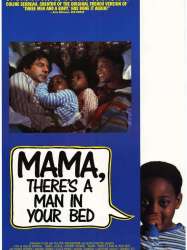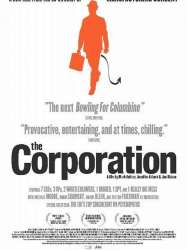Think Global, Act Rural is a french film of genre Documentary directed by Coline Serreau
Think Global, Act Rural (2010)
Solutions locales pour un désordre global

If you like this film, let us know!
- Infos
- Casting
- Technical infos
- Photos
- Videos
- Film quotes
- Characters
- Music
- Awards
Length 1h53
Directed by Coline Serreau
OriginFrance
Genres Documentary
Themes Environmental films, La mondialisation, Films about the labor movement, Documentary films about environmental issues, Documentaire sur le monde du travail
Rating76%










Solutions locales pour un désordre global est un film documentaire de Coline Serreau. Il est sorti en France le 7 avril 2010.
Synopsis
« Les films d'alertes et catastrophistes ont été tournés. Ils ont eu leur utilité, mais maintenant il faut montrer qu'il existe des solutions, faire entendre les réflexions des philosophes et économistes, qui, tout en expliquant pourquoi notre modèle de société s'est embourbé dans la crise écologique, financière et politique que nous connaissons, inventent et expérimentent des alternatives. »Comments
Leave comment :
Suggestions of similar film to Think Global, Act Rural
There are 11 films with the same director, 8965 with the same cinematographic genres, 1397 films with the same themes (including 12 films with the same 5 themes than Think Global, Act Rural), to have finally 70 suggestions of similar films.If you liked Think Global, Act Rural, you will probably like those similar films :

The Crisis (1992)
, 1h35Directed by Coline Serreau
Origin Italie
Genres Drama, Comedy, Musical
Themes Films about the labor movement, La précarité
Actors Vincent Lindon, Patrick Timsit, Zabou Breitman, Yves Robert, Maria Pacôme, Michèle Laroque
Rating67%





Victor est un conseiller juridique qui se retrouve le même jour licencié et abandonné par sa femme. Lorsqu'il s'aperçoit que ses amis et sa famille font peu de cas de ses mésaventures, son moral commence à flancher, d'autant plus que tout son entourage et notamment sa famille se débat dans les déboires conjugaux. La seule personne qui veuille bien l'écouter se morfondre est Michou, un SDF pas très malin et un peu collant.
 , 1h51
, 1h51Directed by Coline Serreau
Origin France
Genres Comedy, Romantic comedy
Themes Films about families, Films about racism, Films about the labor movement, Films about marriage
Actors Daniel Auteuil, Firmine Richard, Pierre Vernier, Maxime Leroux, Gilles Privat, Catherine Salviat
Rating68%





Romuald Blindet est le PDG de l'entreprise de produits laitiers Blanlait. Juliette Bonaventure, antillaise, est la femme de ménage de l'immeuble où se trouve la société. Elle élève seule ses cinq enfants dans une cité HLM. Elle découvre par hasard que le staff de Romuald est impliqué dans une louche affaire boursière et d'empoisonnement des yaourts. Elle en informe Romuald qui ne prend d'abord pas au sérieux les accusations d'une simple femme de ménage, d'autant plus qu'elle accuse également l'épouse de Romuald de le tromper (sans lui reprocher pour autant d'avoir lui-même une liaison avec sa secrétaire). Découvrant le pot aux roses, Romuald, traqué par la Brigade financière, se réfugie chez Juliette et sollicite son aide pour prouver son innocence. Juliette accepte et regarde sans mot dire Romuald prendre ses aises chez elle sans lever le petit doigt pour l'aider au quotidien. Blanchi de toute accusation, il repart, laissant quelques billets sur la table. Juliette veut faire appel à lui pour l'aider à sortir de prison son fils aîné impliqué dans un trafic de drogue. Mais Romuald est parti aux États-Unis pour plusieurs semaines et sa nouvelle secrétaire, raciste, ne transmet pas le message. Quand Romuald revient, c'est le temps des découvertes : l'identité de l'amant de sa femme, l'idiotie mesquine de sa secrétaire, son amour pour Juliette. Il la demande en mariage mais elle le repousse en lui débitant ses quatre vérités. Romuald joue finement en se mettant les enfants de Juliette dans la poche. Juliette finit par céder et tout se finit à la mairie devant une assemblée bourgeoise stupéfaite de cette union entre deux êtres que tout, a priori, séparait.

Beautiful Green (1996)
, 1h39Directed by Coline Serreau
Origin France
Genres Comedy
Themes Environmental films, Films about anarchism, Politique, Comedy science fiction films, Political films, Films about extraterrestrial life
Actors Coline Serreau, Vincent Lindon, James Thiérrée, Marion Cotillard, Claire Keim, Catherine Samie
Rating71%





On the Green Beautiful, a utopian planet much smaller than Earth, Mila, a rather young woman - by the reckoning of her people, at any rate - volunteers to go on planet Earth at the yearly planet reunion. It has been two hundred years since they had last sent Osam (an old sage) and Mila's father there, and they had come back with what they believed were nasty tidings: the people of Earth lived in a generally bad condition. Osam mentions Napoleon and stresses the fact that at that point in the development on earth, there was still money - a notion that baffles even the wisest folk of the Green Beautiful. Apparently, it seems that without money, you have nothing. In time, we find out that important historical figures such as Jesus and Johann Sebastian Bach had come from this very planet.
 , 1h48
, 1h48Directed by Marie-Monique Robin
Origin France
Genres Documentary
Themes Environmental films, La mondialisation, Films about the labor movement, Documentary films about business, Documentaire sur l'altermondialisme, Documentary films about environmental issues, Documentaire sur le monde du travail
Rating79%





The film reports many controversies surrounding the use and promotion of genetically modified seeds, polychlorinated biphenyls (PCBs), Agent Orange, and bovine growth hormone. Cases in the United States (including Anniston, Alabama), Canada, India, Mexico, Paraguay, the United Kingdom (Scotland) and France, are explored, claiming that the Monsanto corporation's collusion with governments, pressure tactics, suppression and manipulation of scientific data, and extra-legal practices aided the company's attempts at dominating global agriculture. Scientists, representatives of the United States Food and Drug Administration and the United States Environmental Protection Agency, civil society representatives, victims of the company’s activities, lawyers, and politicians are interviewed.

The Inheritors (2011)
, 1h30Origin Mexique
Genres Documentary
Themes Films about alcoholism, Films about education, Films about children, Environmental films, Films about families, Films about immigration, La mondialisation, Films about the labor movement, La précarité, Documentaire sur l'altermondialisme, Documentary films about environmental issues, Documentaire sur le monde du travail
Rating73%





Dans les campagnes mexicaines, la pauvreté se transmet le plus souvent par héritage. De génération en génération, les jeunes reproduisent les gestes des anciens dans un même combat pour survivre.

Katanga Business (2009)
, 1h30Directed by Thierry Michel
Origin Belgique
Genres Documentary
Themes Films set in Africa, Environmental films, La mondialisation, Films about the labor movement, Documentary films about business, Documentary films about environmental issues, Documentaire sur le monde du travail
Rating68%





The province of Katanga in the south east of the Democratic Republic of the Congo (DRC) has huge mineral riches including uranium, zinc, copper and cobalt.

Cursed for Gold (2008)
, 1h33Directed by Olivier Weber
Origin France
Genres Documentary
Themes Environmental films, La mondialisation, Films about the labor movement, Documentary films about business, Documentaire sur l'altermondialisme, Documentary films about environmental issues, Documentaire sur le monde du travail, Documentary films about nature, L'Or

Voices of Transition (2012)
, 1h5Origin France
Genres Documentary
Themes Environmental films, La mondialisation, Films about the labor movement, Documentary films about business, Documentary films about environmental issues, Documentary films about technology, Documentaire sur le monde du travail, Disaster films
Rating75%





Using interviews and overlays of graphics and text, the film presents the current problems facing industrial agriculture. It explores why in the interviewees' view the current industrial model is not up to the task of feeding the world's people. According to the film every calorie of energy contained in a food source currently takes between 10 and 20 calories of crude oil in the production of fertilizers and transportation to produce, leading to a strong dependence of the cost of food on oil prices. As a result of peak oil and increasing oil prices this dependence will lead to ever increasing food prices. According to the film, this dependence already represents a significant weak-spot in the global food supply chain. Additionally, agriculture is already responsible for 40% of greenhouse gas emissions, contributing to climate change. Furthermore, the film argues that the overuse of inorganic fertilizers has been responsible for the loss of soil fertility and threatens the complete loss of usable soil within the next decades through soil erosion and sinking crop yields. These effects, according to the film, can only be partly mitigated by the increased use of those same fertilizers. The loss of workplaces, the concentration of land in the hands of a few (allegedly a farm closes every 23 minutes in France) as well as the dependence on large corporations are enumerated as side effects of the industrialisation of agriculture since the 1920s. Companies, such as Monsanto and Bayer, control everything from seed stock to fertilizers and the necessary chemical mixes for hybrid plants, thereby controlling the entire supply chain. The film argues that this development was supported through subsidies from the World Bank. Interviews with Vandana Shiva, the founder of the Transition Towns movement Rob Hopkins and various agricultural experts serve to argue this viewpoint. The dependence on crude oil is illustrated through the example of the wholesale food market in Rungis.

The Corporation (2003)
, 2h25Directed by Jennifer Abbott, Mark Achbar
Origin Canada
Genres Documentary
Themes Environmental films, Medical-themed films, La mondialisation, Films about the labor movement, Documentary films about business, Documentary films about environmental issues, Documentaire sur une personnalité, Documentary films about politics, Documentary films about health care, Documentaire sur le monde du travail, Films about psychiatry, Films about disabilities, Political films
Actors Michael Moore, Naomi Klein
Rating79%





The documentary shows the development of the contemporary business corporation, from a legal entity that originated as a government-chartered institution meant to affect specific public functions to the rise of the modern commercial institution entitled to most of the legal rights of a person. The documentary concentrates mostly upon North American corporations, especially those in the United States. One theme is its assessment of corporations as persons, as a result of an 1886 case in the United States Supreme Court in which a statement by Chief Justice Morrison R. Waite led to corporations as "persons" having the same rights as human beings, based on the Fourteenth Amendment to the United States Constitution.

We Feed the World (2005)
, 1h36Directed by Erwin Wagenhofer
Origin Austria
Genres Documentary
Themes Cooking films, Environmental films, La mondialisation, Films about the labor movement, Documentaire sur la cuisine, Documentary films about business, Documentaire sur l'altermondialisme, Documentary films about environmental issues, Documentaire sur la malbouffe, Documentaire sur le monde paysan, Documentary films about health care, Documentaire sur le monde du travail
Rating74%





Avec We Feed the World, le documentariste Erwin Wagenhofer propose aux spectateurs un regard sur l'agriculture mondiale moderne. En passant par la Roumanie, l'Autriche, le Brésil, la France et l'Espagne, son enquête se focalise sur la manière dont est fabriqué ce qui arrive dans notre assiette. Il montre que la domination du Nord sur le Sud est prégnante. Comment est-il possible qu'en Afrique l'on achète des produits européens ou asiatiques comme le poulet thaïlandais ? Le réalisateur présente une face peu connue de la mondialisation : en achetant un poulet industriel, on contribue au défrichement de l'Amazonie car le Brésil déforeste pour cultiver le soja qui sert à nourrir les volailles élevées en batterie (90 % de la production de soja du Brésil est exportée). Le documentaire souligne également la différence entre industrie agroalimentaire et petite exploitation. We Feed the World adopte un style « coup de poing » visant à éveiller les consciences.
 Connection
Connection